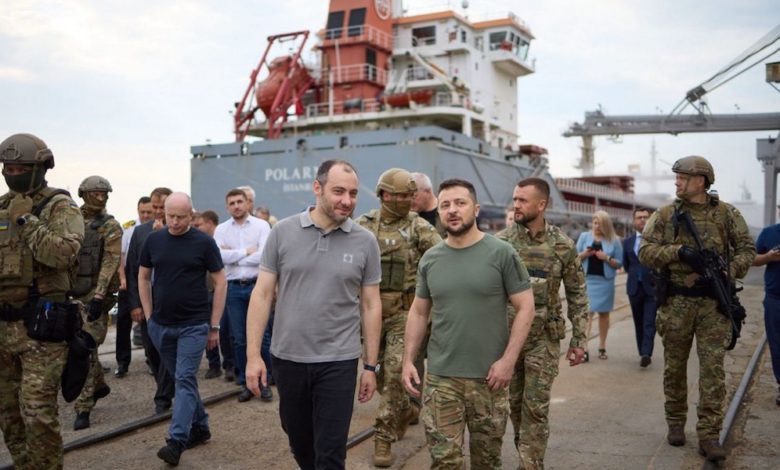
President Volodymyr Zelenskiy has held urgent discussions with his Turkish counterpart as well as the head of NATO over the weekend, desperately trying to find a way to get exports back on track out of Black Sea ports following a highly volatile week in the region where a shipping pact with Russia was abandoned and Ukraine’s top ports came under intense bombardment. The talks have become more urgent as reports emerge this morning of the first Russian drone attacks on Ukrainian infrastructure on the Danube, the back-up export route to get grains to international markets.
NATO and Ukraine will discuss security in the Black Sea this week, after Zelenskiy spoke with the defence organisation’s secretary-general Jens Stoltenberg on Saturday.
Turkish president Recep Tayyip Erdoğan, who has helped persuade Russian president Vladimir Putin to stick with the shipping agreement in the past, has also been tapped by Zelenskiy to see if he can get Putin to change his mind. Erdoğan is due to meet with Putin next month.
“Russia has some expectations. If these are overcome, Russia is in favour of the active work of this grain corridor,” the Turkish president said on Friday.
Data from chartering platform Shipfix shows the number of bulk carriers heading to the Black Sea to pick up grains dropped by more than a third last week, a figure likely to drop further as insurers reassess the situation.
In the wake of the ending of the Black Sea Grain Initiative Ukraine has had to look at moving its exports overland and via the Danube, both routes more costly and less efficient than the deepsea option.
Reports emerged today of drone attacks at Reni, a port on the Danube, near the border with Romania.
Speaking at the Aspen Security Forum on Friday, US secretary of state Anthony Blinken said that, without the Black Sea grain deal, he did not think “it’s possible to make up the volumes lost by ending this initiative through other routes”.
“This has put a deep chill on shipping,” he said.
Adding further alarm to the tense situation in the Black Sea, where both Russia and Ukraine have said in recent days that ships heading to each other’s ports may be considered as carrying military cargo, Russia is now willing to go a step further. The nation’s deputy foreign minister Sergey Vershinin said on Friday Russia wants to inspect ships in the Black Sea to make sure they are not carrying weapons.
Russia’s Federal Security Service (FSB) said it had blocked a foreign cargo ship accused of supplying Ukraine with explosives from entering Russian waters, state-run news agencies reported Monday.
The vessel, traveling from Turkey to southern Russia’s port of Rostov-on-Don to load grain, was banned from crossing the Kerch Strait that leads to ports in occupied southern Ukraine and ordered to leave Russian waters.
The FSB said it had found traces of explosives and “signs of third-party interference in the structural parts of the dry cargo ship” on Saturday, according to the Interfax news agency.
“These circumstances may indicate the possibility of using a foreign civilian vessel to deliver explosives to the territory of Ukraine,” the FSB said.
Traffic was halted on both sides of the Kerch Strait last week in the wake of an attack on a bridge linking Russia with Crimea.
INTERCARGO, which represents the world’s dry bulk carrier owners, today expressed its concern at the cessation of the Black Sea Grain Initiative.
“INTERCARGO stresses the importance of using all resources available to ensure safety of navigation for bulk carriers and their crews, and supports all efforts by the International Maritime Organization (IMO) and international initiatives to find a solution to protect the global supply chain and food security,” the shipping body said in a statement.
